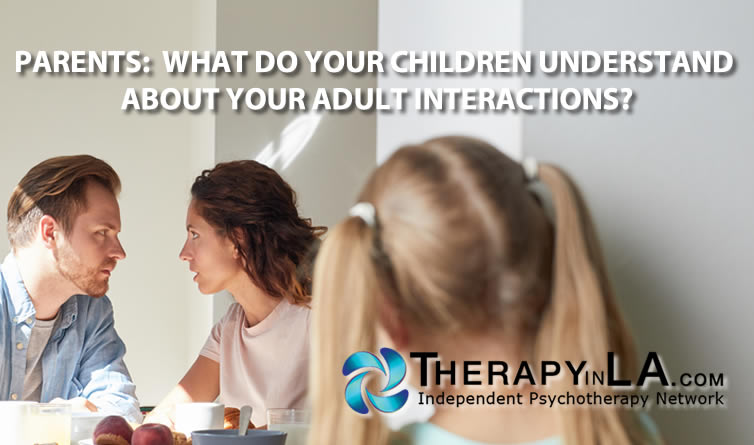PARENTS: WHAT DO YOUR CHILDREN UNDERSTAND ABOUT YOUR ADULT INTERACTIONS?
PARENTS: WHAT DO YOUR CHILDREN UNDERSTAND ABOUT YOUR ADULT INTERACTIONS?
By Sandy Plone, Ph.D.
I ask this question because it has recently come to my attention as clients (and myself privately) think back to parental interactions that seemed unusual at the time. When viewed through the lens of more adult wisdom, these interactions seemed full of meaning.
Some examples: One client recalls one set of parents using endearments when addressing one another (“honey, dear, sweetie”) yet the underlying tone revealed anger and hostility. In other words, the “music” revealed the truth behind the words. He felt confirmed when that couple finally separated in their later years. He had always felt that their marriage was a “LIE”; he had left home at the age of seventeen in part because of that discomfort. Also, he always felt ambivalent towards his parents.
Conversely, I personally have indelible memories of one pair of my aunts and uncles who had also been married for many years. My aunt had been very pretty, though heavy-set as a young woman. I recall finding some lovely books that my uncle had given my aunt when they were courting. These books were inscribed with beautiful love notes, as he was highly educated and could verbalize his thoughts beautifully. And in later years unfortunately my aunt became obese. My clear memory is a visit when we all had a meal together: my uncle looked across the table with a kind, loving expression on his face and said: “I have to tell you Rosa, that I am still in love with you!”
I never forget that moment, although my cousin (their daughter—a few years older than myself) took little notice of that moment. When she and I spoke in later years, she apparently was aware that her parents got along well, but would feel uncomfortable when they got “too mushy”, as compared to my appreciation for their abiding affection.
Another clear very early memory for me is when I was quite surprised when my parents pulled a bed down out of the wall! Well, this was many decades ago when wall-beds were popular, especially in a small one-bedroom apartment during the Depression. Since I, as a child, slept in the only bedroom, I had never seen the wall-bed before. The pertinent issue is that I (at about three years old) perceived my father’s discomfort when I saw and became curious. I recalled that obvious discomfort, and could make sense of it as an adult, especially as a trained psychologist. It was likely his discomfort about their sexual relationship when his young daughter questioned the existence of a marital bed. As an immigrant with English as a second language may have felt both inhibited and embarrassed.
These examples illustrate how children, even very young ones, can have some sense of what is being truly exchanged between their parents. Being aware of this and careful about communicating between partners is quite important, as our kids often come to know more than we might think they do. Psychologists with IPN often help parents consider these subtleties in their family interactions, in the hopes of benefitting family relationships and the development of their children.
Sondra Plone, Ph.D. is a clinical psychologist, who retired in 2022. She is a member of the Independent Psychotherapy Network, who can be reached at dr.splone1@gmail.com.
Copyright 2022 by Sondra Plone, Ph.D.

